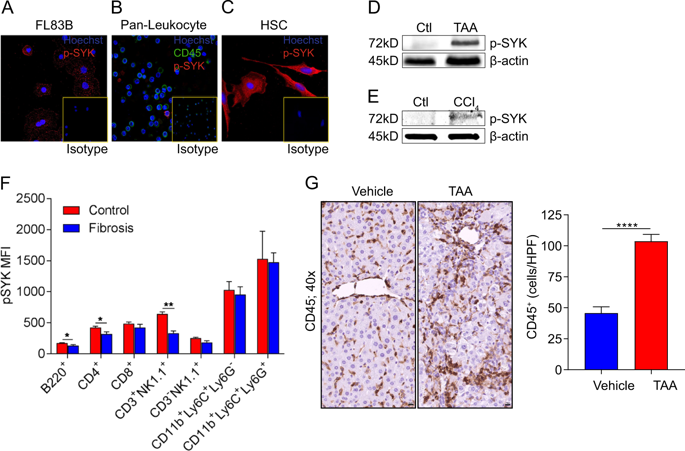Our official English website, www.x-mol.net, welcomes your
feedback! (Note: you will need to create a separate account there.)
Targeting SYK signaling in myeloid cells protects against liver fibrosis and hepatocarcinogenesis.
Oncogene ( IF 6.9 ) Pub Date : 2019-02-11 , DOI: 10.1038/s41388-019-0734-5 Alejandro Torres-Hernandez 1 , Wei Wang 1 , Yuri Nikiforov 1 , Karla Tejada 1 , Luisana Torres 1 , Aleksandr Kalabin 1 , Yue Wu 1 , Muhammad Israr Ul Haq 1 , Mohammed Y Khan 1 , Zhen Zhao 1 , Wenyu Su 1 , Jimmy Camargo 1 , Mautin Hundeyin 1 , Brian Diskin 1 , Salma Adam 1 , Juan A Kochen Rossi 1 , Emma Kurz 1 , Berk Aykut 1 , Sorin A A Shadaloey 1 , Joshua Leinwand 1 , George Miller 1, 2
Oncogene ( IF 6.9 ) Pub Date : 2019-02-11 , DOI: 10.1038/s41388-019-0734-5 Alejandro Torres-Hernandez 1 , Wei Wang 1 , Yuri Nikiforov 1 , Karla Tejada 1 , Luisana Torres 1 , Aleksandr Kalabin 1 , Yue Wu 1 , Muhammad Israr Ul Haq 1 , Mohammed Y Khan 1 , Zhen Zhao 1 , Wenyu Su 1 , Jimmy Camargo 1 , Mautin Hundeyin 1 , Brian Diskin 1 , Salma Adam 1 , Juan A Kochen Rossi 1 , Emma Kurz 1 , Berk Aykut 1 , Sorin A A Shadaloey 1 , Joshua Leinwand 1 , George Miller 1, 2
Affiliation

|
Liver fibrosis and fibrosis-associated hepatocarcinogenesis are driven by chronic inflammation and are leading causes of morbidity and death worldwide. SYK signaling regulates critical processes in innate and adaptive immunity, as well as parenchymal cells. We discovered high SYK expression in the parenchymal hepatocyte, hepatic stellate cell (HSC), and the inflammatory compartments in the fibrotic liver. We postulated that targeting SYK would mitigate hepatic fibrosis and oncogenic progression. We found that inhibition of SYK with the selective small molecule inhibitors Piceatannol and PRT062607 markedly protected against toxin-induced hepatic fibrosis, associated hepatocellular injury and intra-hepatic inflammation, and hepatocarcinogenesis. SYK inhibition resulted in increased intra-tumoral expression of the p16 and p53 but decreased expression of Bcl-xL and SMAD4. Further, hepatic expression of genes regulating angiogenesis, apoptosis, cell cycle regulation, and cellular senescence were affected by targeting SYK. We found that SYK inhibition mitigated both HSC trans-differentiation and acquisition of an inflammatory phenotype in T cells, B cells, and myeloid cells. However, in vivo experiments employing selective targeted deletion of SYK indicated that only SYK deletion in the myeloid compartment was sufficient to confer protection against fibrogenic progression. Targeting SYK promoted myeloid cell differentiation into hepato-protective TNFαlow CD206hi phenotype downregulating mTOR, IL-8 signaling and oxidative phosphorylation. Collectively, these data suggest that SYK is an attractive target for experimental therapeutics in treating hepatic fibrosis and oncogenesis.
中文翻译:

在髓样细胞中靶向SYK信号转导可防止肝纤维化和肝癌发生。
肝纤维化和与纤维化相关的肝癌发生是由慢性炎症驱动的,并且是全世界发病率和死亡的主要原因。SYK信号传导调节先天性和适应性免疫以及实质细胞中的关键过程。我们发现实质肝细胞,肝星状细胞(HSC)和纤维化肝脏中的炎性区室中高SYK表达。我们假设靶向SYK可以减轻肝纤维化和致癌进程。我们发现,选择性小分子抑制剂Piceatannol和PRT062607对SYK的抑制作用显着保护了毒素诱导的肝纤维化,相关的肝细胞损伤和肝内炎症以及肝癌的发生。SYK抑制导致p16和p53的肿瘤内表达增加,但Bcl-xL和SMAD4的表达减少。此外,靶向SYK会影响调节血管生成,凋亡,细胞周期调控和细胞衰老的基因的肝表达。我们发现SYK抑制减轻了HSC转分化和T细胞,B细胞和骨髓细胞中炎症表型的获得。但是,采用选择性靶向删除SYK的体内实验表明,只有髓样区室中的SYK删除才足以提供针对纤维化进展的保护作用。靶向SYK促进髓样细胞分化为肝保护性TNFα低CD206hi表型,从而下调mTOR,IL-8信号传导和氧化磷酸化。总的来说,
更新日期:2019-02-13
中文翻译:

在髓样细胞中靶向SYK信号转导可防止肝纤维化和肝癌发生。
肝纤维化和与纤维化相关的肝癌发生是由慢性炎症驱动的,并且是全世界发病率和死亡的主要原因。SYK信号传导调节先天性和适应性免疫以及实质细胞中的关键过程。我们发现实质肝细胞,肝星状细胞(HSC)和纤维化肝脏中的炎性区室中高SYK表达。我们假设靶向SYK可以减轻肝纤维化和致癌进程。我们发现,选择性小分子抑制剂Piceatannol和PRT062607对SYK的抑制作用显着保护了毒素诱导的肝纤维化,相关的肝细胞损伤和肝内炎症以及肝癌的发生。SYK抑制导致p16和p53的肿瘤内表达增加,但Bcl-xL和SMAD4的表达减少。此外,靶向SYK会影响调节血管生成,凋亡,细胞周期调控和细胞衰老的基因的肝表达。我们发现SYK抑制减轻了HSC转分化和T细胞,B细胞和骨髓细胞中炎症表型的获得。但是,采用选择性靶向删除SYK的体内实验表明,只有髓样区室中的SYK删除才足以提供针对纤维化进展的保护作用。靶向SYK促进髓样细胞分化为肝保护性TNFα低CD206hi表型,从而下调mTOR,IL-8信号传导和氧化磷酸化。总的来说,











































 京公网安备 11010802027423号
京公网安备 11010802027423号